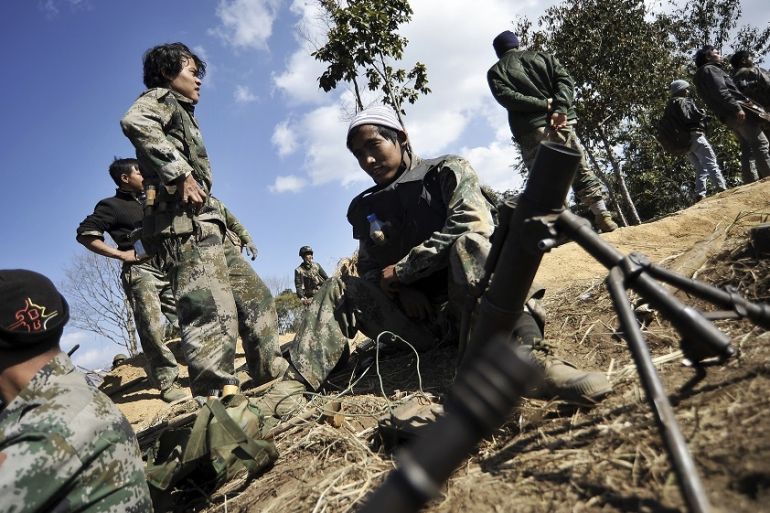The struggles of Myanmar’s peace process
With all sides guilty of abuses, it’s civilians who are the main victims and as the conflicts drag on, they and their communities continue to fall further behind.

Myanmar‘s peace process with ethnic minority groups appears to be floundering because of a deteriorating relationship between the government and its military – or, perhaps, as some would say, the military and its government.
No date has been set for a third round of peace talks between the administration of State Counsellor Aung San Suu Kyi and rebel groups. Originally scheduled for January, there have been several postponements and some representatives of ethnic groups are sceptical it can happen any time soon.
Keep reading
list of 4 itemsGaza’s mass graves: Is the truth being uncovered?
US report finds possible Israeli violations of international law in Gaza
South Africa asks ICJ to order Israel to withdraw from Gaza’s Rafah
The recent violence in Kachin State, where thousands have been forced from their homes because of renewed fighting between government troops and the Kachin Independence Army (KIA), will only add to those doubts.
The KIA has not signed the so-called Nationwide Ceasefire Agreement (NCA) that was reached under former president and retired army General Thein Sein and his pseudo-civilian government, which was predominantly made up of the same people who ran the country under military rule.
For some groups that did sign the deal, like the Karen National Liberation Army, the NCA is becoming increasingly irrelevant because they are regularly having to fend off incursions by government soldiers into their areas.
Understandably, this raises the question how can a peace deal be reached when the ceasefire isn’t holding?
It may seem remarkable, given the bloody wars the ethnic armies have been engaged in for so many years, but there appears to be a feeling among them that it was easier dealing with the previous government, which was dominated by retired army personnel, than it has been trying to negotiate with the civilian National League for Democracy (NLD) party that is currently in power. It’s in power by name only, because the military is still the most powerful political force in the country.
When Thein Sein’s administration was in office, rebels knew they were, for the most part, talking to the government and the military at the same time. Today’s negotiations are different and possibly hollow because the fighters know the civilians in the Aung San Suu Kyi government don’t have much decision-making ability, without consulting with the generals.
They also know that the relationship between the government and the armed forces is strained because the two are pulling in opposite directions. The NLD ultimately wants the military out of politics and in turn, the army knows that it can undermine the government on many fronts and is trying to protect its own interests and sources of income.
Conservative generals are staunch in their view that they will remain in politics for some time and that the difficult relationship they have with Aung San Suu Kyi and her people must be resolved, or at least improved, before the peace process can make any significant progress and that means someone has to make concessions.
According to a senior official with close connections to the army’s top brass, they don’t believe in the government’s processes or its vision for peace, so they feel they have to continue making decisions on their own when it comes to dealing with issues in the rebel-held areas.
When Aung San Suu Kyi’s party won the election in 2015, the former democracy campaigner proclaimed that peace with the ethnic minority groups would be her top priority.
But instead of continuing with processes and personnel that had been intimately involved in the talks under the previous administration, she pushed many of them to the side, including some negotiators who had once championed her cause.
The ethnic groups now say that the government team tasked with finding peace rarely travels to their parts of the country to see or hear first-hand what the issues are.
This is of course a complicated problem in a diverse and complex country where, in some cases, there have been decades of fighting between the state and rebels who are vying for many things such as rights, religion, recognition, autonomy, territory, resources and money, including income from the drug trade that fuels some of the conflicts.
All sides have been guilty of abuses that continue today and will likely continue for some time. As usual, it’s civilians who are the main victims and as the conflicts drag on, they and their communities continue to fall further behind.